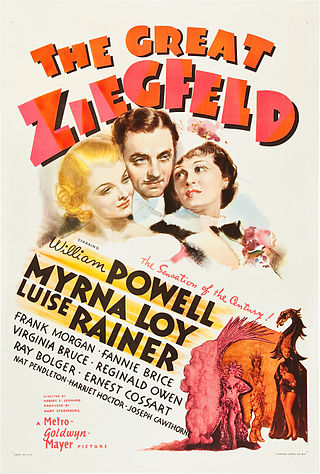
The Great Ziegfeld is a 1936 American musical drama film directed by Robert Z. Leonard and produced by Hunt Stromberg. It stars William Powell as the theatrical impresario Florenz "Flo" Ziegfeld Jr., Luise Rainer as Anna Held, and Myrna Loy as Billie Burke.

Baroness Emma Orczy, usually known as Baroness Orczy or to her family and friends as Emmuska Orczy, was a Hungarian-born British novelist and playwright. She is best known for her series of novels featuring the Scarlet Pimpernel, the alter ego of Sir Percy Blakeney, a wealthy English fop who turns into a quick-thinking escape artist in order to save French aristocrats from "Madame Guillotine" during the French Revolution, establishing the "hero with a secret identity" in popular culture.
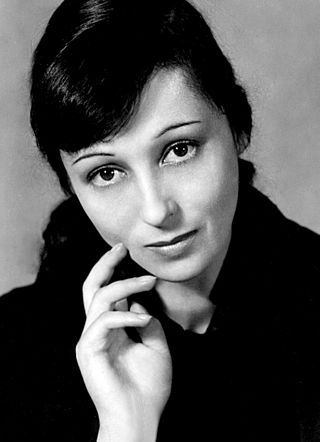
Luise Rainer was a German-born film actress. She was the first thespian to win multiple Academy Awards, and the first to win back-to-back; at the time of her death, thirteen days shy of her 105th birthday, she was the longest-lived Oscar recipient, a superlative that has not been exceeded, as of 2024.
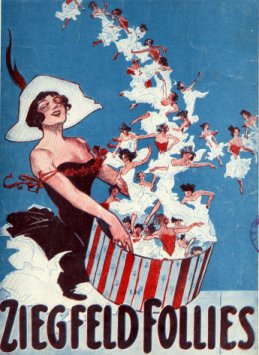
The Ziegfeld Follies were a series of elaborate theatrical revue productions on Broadway in New York City from 1907 to 1931, with renewals in 1934, 1936, 1943, and 1957. They became a radio program in 1932 and 1936 as The Ziegfeld Follies of the Air.
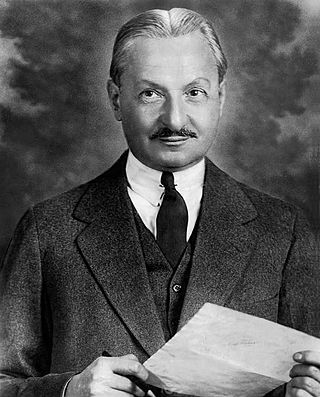
Florenz Edward Ziegfeld Jr. was an American Broadway impresario, notable for his series of theatrical revues, the Ziegfeld Follies (1907–1931), inspired by the Folies Bergère of Paris. He also produced the musical Show Boat. He was known as the "glorifier of the American girl". Ziegfeld is a member of the American Theater Hall of Fame.
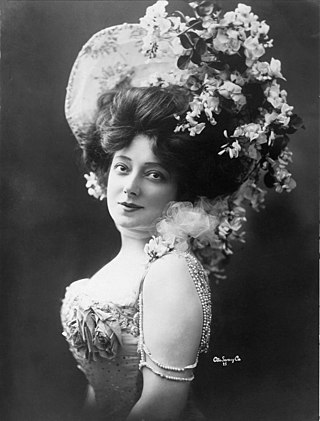
Helene Anna Held was a Polish-born French stage performer of Jewish origin on Broadway. While appearing in London, she was spotted by impresario Florenz Ziegfeld, who brought her to America as his common-law wife. From 1896 through 1910, she was one of Broadway's most celebrated leading ladies, presented in a succession of musicals as a charming, coquettish Parisian singer and comedienne, with an hourglass figure and an off-stage reputation for exotic behavior, such as bathing in 40 gallons of milk a day to maintain her complexion. Detractors implied that her fame owed more to Ziegfeld's promotional flair than to any intrinsic talent, but her audience allure was undeniable for over a decade, with several of her shows setting house attendance records for their time. Her uninhibited style also inspired the long-running series of popular revues, the Ziegfeld Follies.
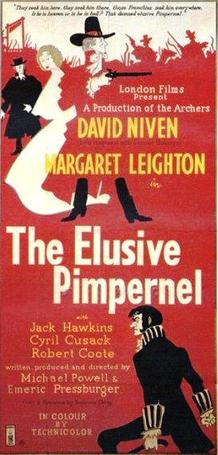
The Elusive Pimpernel is a 1950 British period adventure film by the British-based director-writer team of Michael Powell and Emeric Pressburger, based on the novel The Scarlet Pimpernel (1905) by Baroness Emmuska Orczy. It was released in the United States under the title The Fighting Pimpernel. The picture stars David Niven as Sir Percy Blakeney, Margaret Leighton as Marguerite Blakeney and features Jack Hawkins, Cyril Cusack and Robert Coote. Originally intended to be a musical, the film was re-worked as a light-hearted drama.

Broadway Melody of 1938 is a 1937 American musical film produced by Metro-Goldwyn-Mayer and directed by Roy Del Ruth. The film is essentially a backstage musical revue, featuring high-budget sets and cinematography in the MGM musical tradition. The film stars Eleanor Powell and Robert Taylor and features Buddy Ebsen, George Murphy, Judy Garland, Sophie Tucker, Raymond Walburn, Robert Benchley and Binnie Barnes.

The House on 92nd Street is a 1945 black-and-white American spy film directed by Henry Hathaway. The movie, shot mostly in New York City, was released shortly after the end of World War II. The House on 92nd Street was made with the full cooperation of the Federal Bureau of Investigation (FBI), whose director, J. Edgar Hoover, appears during the introductory montage. The FBI agents shown in Washington, D.C. were played by actual agents. The film's semidocumentary style inspired other films, including The Naked City and Boomerang.

Ziegfeld Follies is a 1945 American musical comedy film released by Metro-Goldwyn-Mayer (MGM), primarily directed by Vincente Minnelli, with segments directed by Lemuel Ayers, Roy Del Ruth, Robert Lewis, and George Sidney, the film's original director before Minnelli took over. Other directors that are claimed to have made uncredited contributions to the film are Merrill Pye, Norman Taurog, and Charles Walters. It stars many MGM leading talents, including Fred Astaire, Lucille Ball, Lucille Bremer, Fanny Brice, Judy Garland, Kathryn Grayson, Lena Horne, Gene Kelly, James Melton, Victor Moore, William Powell, Red Skelton, and Esther Williams.

Knight Without Armour is a 1937 British historical drama film starring Marlene Dietrich and Robert Donat. It was directed by Jacques Feyder and produced by Alexander Korda from a screenplay by Lajos Bíró adapted by Frances Marion from the 1933 novel by James Hilton. The novel was published in the United States as Without Armour. The music score was by Miklós Rózsa, his first for a motion picture, using additional music by Tchaikovsky.

The Scarlet Pimpernel is a 1934 British adventure film directed by Harold Young and starring Leslie Howard, Merle Oberon, and Raymond Massey. Based on the 1905 play by Baroness Orczy and Montagu Barstow and the classic 1905 adventure novel by Orczy, the film is about an eighteenth-century English aristocrat (Howard) who leads a double life, passing himself off as an effete aristocrat while engaged in a secret effort to rescue French nobles from Robespierre's Reign of Terror. The film was produced by Alexander Korda. Howard's portrayal of the title character is often considered the definitive portrayal of the role. In 1941, he played a similar role in "'Pimpernel' Smith" but this time set in pre-WWII Germany.
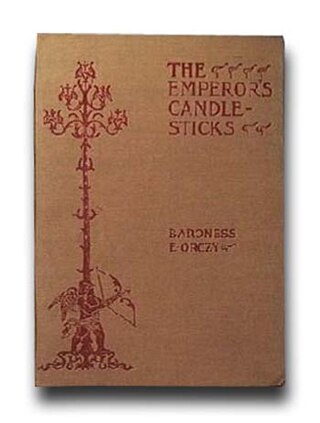
The Emperor's Candlesticks is an 1899 historical novel by Baroness Orczy. Written soon after the birth of her son John, it was her first book as an author rather than translator and was a commercial failure. As in the Scarlet Pimpernel, the theme is international intrigue, but this time the setting is pre-World War I Europe and Russia rather than Revolutionary France.

Sherlock Holmes in Washington (1943) is the fifth film in the Basil Rathbone/Nigel Bruce series of Sherlock Holmes movies. The plot is an original story not based on any of Sir Arthur Conan Doyle's Holmes tales.

Escape is a 1940 drama film about an American in pre-World War II Nazi Germany who discovers his mother is in a concentration camp and tries desperately to free her. It starred Norma Shearer, Robert Taylor, Conrad Veidt and Nazimova. It was adapted from the novel of the same name by Grace Zaring Stone.
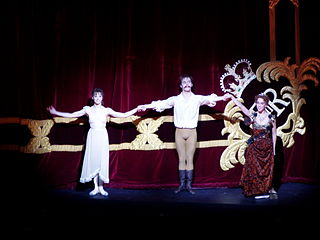
Mayerling is a ballet choreographed by Kenneth MacMillan to the music of Franz Liszt, arranged by John Lanchbery, scenario by Gillian Freeman and designed by Nicholas Georgiadis. The ballet is based on the Mayerling incident, a series of events surrounding the apparent murder–suicide of Rudolf, Crown Prince of Austria and his lover, Baroness Mary Vetsera. The ballet premiered on 14 February 1978, at the Royal Opera House, danced by The Royal Ballet, with David Wall as Prince Rudolf and Lynn Seymour as Vetsera.
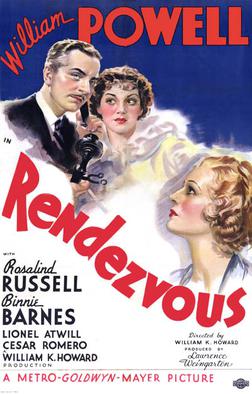
Rendezvous is a 1935 American spy film set in World War I, directed by William K. Howard, starring William Powell and Rosalind Russell and featuring Binnie Barnes, Lionel Atwill, Cesar Romero and Samuel S. Hinds. Powell plays an American cryptologist who tangles with German spies while falling in love.
The I Don't Care Girl is a 1953 American biographical film directed by Lloyd Bacon and starring Mitzi Gaynor. It is a biography of entertainer Eva Tanguay. The film was shot in Technicolor.

The Life of the Party is a 1937 American musical comedy film produced by RKO. It was directed by William A. Seiter and starred Joe Penner, Gene Raymond, Parkyakarkus and Harriet Hilliard. It recorded a loss of $111,000.

The Night Is Young is a 1935 American romantic musical film starring Ramon Novarro and Evelyn Laye. The film is based on a story written by Vicki Baum and directed by Dudley Murphy.



















